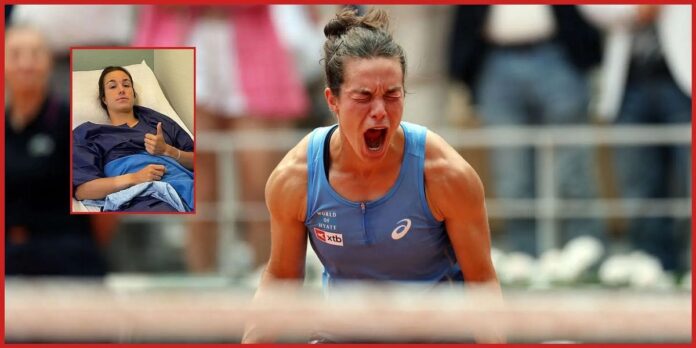If finding 381-ranked Lois Boisson in the 2025 French Open quarterfinal after a stunning win against third seed Jessica Pegula shocks you, it’s time for a tennis history lesson.
Big serves and raw power have been behind similar upsets on the Grand Slam stage in the past. The last time a player ranked lower than the Frenchwoman made a quarterfinal at this level was back in 2017. The player you ask? Kaia Kanepi, the Estonian who possessed a pulverizing forehand and a serve that could win free points on just about any surface.
Kanepi had beaten big names including Naomi Osaka, Daria Kasatkina, and Francesca Schiavone en route to the quarterfinal before surrendering to eventual finalist Madison Keys. Here at the French Open this year, Boisson, who plays a brand of tennis not much different from Kanepi’s, has collected a few noteworthy scalps of her own. None, however, would feel more special than Pegula.
The 22-year-old, who was backed by a vocal Court Philippe-Chatrier crowd, was all but out when she trailed Pegula 3-6, 3-4. To her credit, though, she kept going for her shots, the serve and forehand in particular. While she ended the match with just three aces to her name, she was much more impactful on serve, especially as the game progressed. She was thundering down serves in the 200 kmph range even in the first set, but the follow-up was missing. That improved as the match got intense.
A wildcard entrant into the main draw given her lowly ranking, Lois Boisson fended off four break points in her final game before fittingly sealing a 4-6, 6-3, 6-3 win with a piercing forehand. She will now rise to a career-high ranking of No. 120 irrespective of future results at the tournament. What makes the feat even more impressive is the fact that she was restricted to her bed because of injury woes up until a few months ago.
Rise, fall, and rise again for Lois Boisson

Sport can be ruthless, and Lois Boisson learnt that the hard way. The Frenchwoman was on the rise early in 2024, having just won her maiden 125k title at Saint-Malo after beating compatriot Chloe Paquet in the final. However, tragedy struck as she tore her anterior cruciate ligament (ACL). A surgery and months of rehab and recovery followed. She watched the season whizz by from the sidelines.
Hapless, she shared her frustration and hope for a quick recovery in an emotional social media post:
"This last week has been very pain full emotionally, the impression that everything is stopping and does not have anymore sense. I was finally truly fulfilled on a tennis court, the process was well underway, surrounded by a awesome team, I was going to play the tournaments that I have dreamed of since I started playing tennis," Lois Boisson had written in an Instagram post.
"In the space of a week I went from «collapsed » to the ground, the joy of winning my first WTA title, to « collapsed » to the ground because my knee gave out and the pain was immense. The shock is violent, I didn't imagine the rest of the season this way... But this is the path that life has decided to give me, now it's time for discipline to get back to the top!" she had added.
The new year brought a fresh start, but by then, all the gains from 12 months ago had disappeared. Her ranking had plummeted, and anyone who has played on the lower rungs of the tennis circuit would tell you the pain of having to get yourself placed high enough on the ladder to avoid painstaking qualification rounds tournament after tournament.
A return home finally brought her some hope. Lois Boisson won her first Tour-level match at Rouen in the lead-up to the French Open. Even so, a sly comment about body odor from opponent Harriet Dart became the talking point more than the kind of tennis she was showing on court. Boisson, however, is thick-skinned. "It was not difficult to deal with. It was okay. It was nothing for me. She maybe made a mistake, then I joked about it, that's it," Boisson said of Dart's remarks, for which the Brit had later apologised.
The Frenchwoman lost a tight three-setter to Moyuka Uchijima in the second round at Rouen and faltered at the very first step of her title defense in Saint-Malo. Little did she know that things would begin to look up for her soon.
A French Open fairytale

Hear this: At 103, Lois Boisson came into the French Open fourth-round contest against Jessica Pegula as one of the women's draw leaders in terms of winners struck.
Numbers don't lie. Boisson's game, which appeared scrappy at the beginning of the match, was always on an upward trajectory, and she peaked at the back end of the second set to push for a decider.
That Pegula is no pushover is no secret, and the American fought back hard, bringing out every weapon in her arsenal, starting from the dropshot to her clutch volleying skills. In fact, she ended the match with more winners, 46 in comparison to her opponent's 30. Alas, it was not enough against an inspired opponent playing in front of the biggest crowd support that she had ever seen.
"I really don't know what to say," Lois Boisson said during her on-court interview. "Playing on this court with such an atmosphere was incredible. I knew I could do it, but she's super strong. When I saw that it was possible, I gave everything I had. It's incredible."
Opportunities like Grand Slam wildcards come the way of a select few, and Boisson knows that. She has made the most of it. The Frenchwoman touched upon the idea of self-belief in her on-court interview, being someone who would be seen as out of depth in a stacked Grand Slam draw. She said she was willing to give it her all in matches to come. And when you have a game as explosive and a made-for-clay forehand, "her all" could well be enough for a few more wins.





